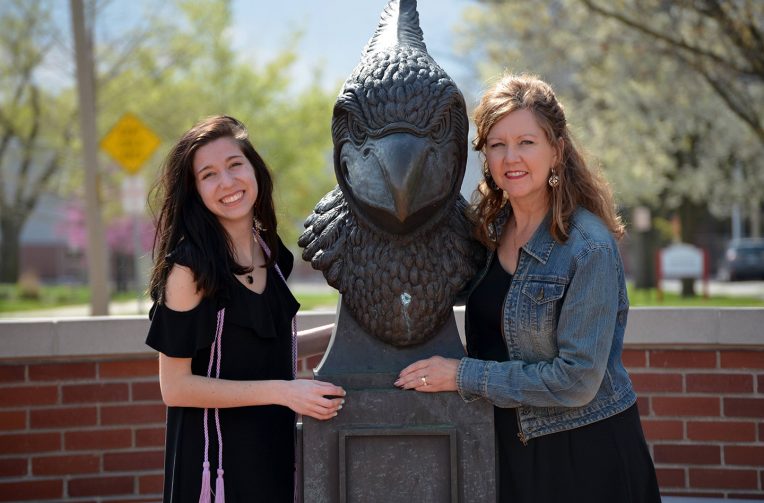Rachel Sabella ’21 considers herself a person who understands “death positivity.”
“Death positivity is really just being comfortable with the fact that you will die, and that realization helps you embrace life. It reminds you to see what is important,” said Sabella, who has seen people dealing with death more than most. Since the age of 10, Sabella grew up above a funeral home in O’Fallon, Illinois, where her mother, Kim, serves as the director.
As she grew older, Sabella began helping her parents in the funeral home with office work. One of the duties was acting as part of the two-person team required to enter death certificates online. When Sabella entered Illinois State University, her courses in the Women’s, Gender, and Sexuality Studies (WGSS) program prompted her to look at the death certificates in a different light. “I’d always considered myself a feminist, but in college I began to re-examine my everyday views and decisions within the WGSS curriculum,” she said.
In WGSS classes, Sabella discovered the concept of intersectionality, a framework used to understand how a person’s social, gender, and political identities combine to shape perceptions that factor into privilege or oppression. “I realized how intersectionality played into death as well as life,” she said. The online categories for “sex” on Illinois death certificates were relegated to M for male, F for female, and U for unknown—a term used when the sex of the remains cannot be determined. “U is meant for really extreme circumstances,” said Sabella, “but my fear was that funeral home directors might be using the box when there was a question of gender identity.” Sabella brought her concerns up to her mother on more than one occasion. “It just didn’t seem right,” she said. Her mother agreed.
“The reality is that gone are the ‘old days’ of recognizing or identifying persons’ genders simply by the nature of their name, appearance, or frankly, limited and basic medical records and information,” said Kim Sabella. She emailed the Illinois Vital Records Division (IVR) of the Illinois Department of Public Health inquiring about a change. “The death certificate is an official legal document that is filed within the registration district in the State of Illinois when a person dies,” Kim said. “The integrity and accuracy of this document is, and should be, of utmost importance to the funeral director who is tasked with obtaining necessary information. One’s accurate gender identity is as important as the correct spelling of the deceased’s name, or Social Security number.”
Kim copied her daughter Rachel on the email, who provided further input. Rachel explained the difference between nonbinary and intersex and emphasized that more than terminology is at stake. “These are used as statistics by the state,” said Rachel. “If they wanted to report what percentage of breast cancer deaths are from women, there was a chance they were missing information.” Rachel also noted the significance of the date of her email reply, March 31, 2021. “We were corresponding on International Transgender Day of Visibility,” she said.
The representative from IVR thanked them for the suggestion, noting he would pass it along. As it turns out, the Illinois Department of Public Health had already been working on the change to systems. The Sabellas were not alone in their desire to move in the right direction. The IVR sent an email to Kim and Rachel on April 13, 2021, letting them know the change had been finalized. The system now offers the possibility of M, F, X, or U. “When X is entered, it prints as nonbinary,” said Rachel. “I read that email in Milner Library and I started crying with joy.”
Rachel noted it is the work of programs like Illinois State’s WGSS that lays a foundation for change. “I consider it thanks to educational opportunities like WGSS that this death certificate change was considered ‘inevitable,’” said Rachel. “Lots of people have worked so hard over the years to create a culture and society in which it’s becoming safer to talk about things like gender identity, and I am so proud to have gotten my education from our wonderful program.”
Graduating in May with a bachelor’s degree in anthropology and a minor in WGSS, Rachel now works as an intern with the Downtown Bloomington Farmers Market and for PrairiErth Farms. She continues to advocate for greater understanding of the importance of gender identities, both in life and in death. “People are, understandably, very uncomfortable when it comes to death,” said Rachel, “but it is a great opportunity to bring the people close to you into the conversation, and that includes gender identity.”

